- Home
- Brandon Sanderson
Sixth of the Dusk (Cosmere) Page 3
Sixth of the Dusk (Cosmere) Read online
Page 3
“You may sleep in my safecamp tonight,” Dusk said, turning back to her.
“And then what?” she asked. “You turn me out into the jungle to die?”
“You did well on your way here,” he said, grudgingly. She was not a trapper. A scholar should not have been able to do what she did. “You will probably survive.”
“I got lucky. I’d never make it across the entire island.”
Dusk paused. “Across the island?”
“To the main company camp.”
“There are more of you?”
“I . . . Of course. You didn’t think . . .”
“What happened?” Now who is the fool? he thought to himself. You should have asked this first. Talking. He had never been good with it.
She shied away from him, eyes widening. Did he look dangerous? Perhaps he had barked that last question forcefully. No matter. She spoke, so he got what he needed.
“We set up camp on the far beach,” she said. “We have two ironhulls armed with cannons watching the waters. Those can take on even a deepwalker, if they have to. Two hundred soldiers, half that number in scientists and merchants. We’re determined to find out, once and for all, why the Aviar must be born on one of the Pantheon Islands to be able to bestow talents.
“One team came down this direction to scout sites to place another fortress. The company is determined to hold Patji against other interests. I thought the smaller expedition a bad idea, but had my own reasons for wanting to circle the island. So I went along. And then, the deepwalker . . .” She looked sick.
Dusk had almost stopped listening. Two hundred soldiers? Crawling across Patji like ants on a fallen piece of fruit. Unbearable! He thought of the quiet jungle broken by the sounds of their racketous voices. The sound of humans yelling at each other, clanging on metal, stomping about. Like a city.
A flurry of dark feathers announced Sak coming up from below and landing on the lip of the trapdoor beside Vathi. The black-plumed bird limped across the roof toward Dusk, stretching her wings, showing off the scars on her left. Flying even a dozen feet was a chore for her.
Dusk reached down to scratch her neck. It was happening. An invasion. He had to find a way to stop it. Somehow . . .
“I’m sorry, Dusk,” Vathi said. “The trappers are fascinating to me; I’ve read of your ways, and I respect them. But this was going to happen someday; it’s inevitable. The islands will be tamed. The Aviar are too valuable to leave in the hands of a couple hundred eccentric woodsmen.”
“The chiefs . . .”
“All twenty chiefs in council agreed to this plan,” Vathi said. “I was there. If the Eelakin do not secure these islands and the Aviar, someone else will.”
Dusk stared out into the night. “Go and make certain there are no insects in the cups below.”
“But—”
“Go,” he said, “and make certain there are no insects in the cups below!”
The woman sighed softly, but retreated into the room, leaving him with his Aviar. He continued to scratch Sak on the neck, seeking comfort in the familiar motion and in her presence. Dared he hope that the shadows would prove too deadly for the company and its iron-hulled ships? Vathi seemed confident.
She did not tell me why she joined the scouting group. She had seen a shadow, witnessed it destroying her team, but had still managed the presence of mind to find his camp. She was a strong woman. He would need to remember that.
She was also a company type, as removed from his experience as a person could get. Soldiers, craftsmen, even chiefs he could understand. But these soft-spoken scribes who had quietly conquered the world with a sword of commerce, they baffled him.
“Father,” he whispered. “What do I do?”
Patji gave no reply beyond the normal sounds of night. Creatures moving, hunting, rustling. At night, the Aviar slept, and that gave opportunity to the most dangerous of the island’s predators. In the distance a nightmaw called, its horrid screech echoing through the trees.
Sak spread her wings, leaning down, head darting back and forth. The sound always made her tremble. It did the same to Dusk.
He sighed and rose, placing Sak on his shoulder. He turned, and almost stumbled as he saw his corpse at his feet. He came alert immediately. What was it? Vines in the tree branches? A spider, dropping quietly from above? There wasn’t supposed to be anything in his safecamp that could kill him.
Sak screeched as if in pain.
Nearby, his other Aviar cried out as well, a cacophony of squawks, screeches, chirps. No, it wasn’t just them! All around . . . echoing in the distance, from both near and far, wild Aviar squawked. They rustled in their branches, a sound like a powerful wind blowing through the trees.
Dusk spun about, holding his hands to his ears, eyes wide as corpses appeared around him. They piled high, one atop another, some bloated, some bloody, some skeletal. Haunting him. Dozens upon dozens.
He dropped to his knees, yelling. That put him eye-to-eye with one of his corpses. Only this one . . . this one was not quite dead. Blood dripped from its lips as it tried to speak, mouthing words that Dusk did not understand.
It vanished.
They all did, every last one. He spun about, wild, but saw no bodies. The sounds of the Aviar quieted, and his flock settled back into their nests. Dusk breathed in and out deeply, heart racing. He felt tense, as if at any moment a shadow would explode from the blackness around his camp and consume him. He anticipated it, felt it coming. He wanted to run, run somewhere.
What had that been? In all of his years with Sak, he had never seen anything like it. What could have upset all of the Aviar at once? Was it the nightmaw he had heard?
Don’t be foolish, he thought. This was different, different from anything you’ve seen. Different from anything that has been seen on Patji. But what? What had changed . . .
Sak had not settled down like the others. She stared northward, toward where Vathi had said the main camp of invaders was setting up.
Dusk stood, then clambered down into the room below, Sak on his shoulder. “What are your people doing?”
Vathi spun at his harsh tone. She had been looking out of the window, northward. “I don’t—”
He took her by the front of her vest, pulling her toward him in a two-fisted grip, meeting her eyes from only a few inches away. “What are your people doing?”
Her eyes widened, and he could feel her tremble in his grip, though she set her jaw and held his gaze. Scribes were not supposed to have grit like this. He had seen them scribbling away in their windowless rooms. Dusk tightened his grip on her vest, pulling the fabric so it dug into her skin, and found himself growling softly.
“Release me,” she said, “and we will speak.”
“Bah,” he said, letting go. She dropped a few inches, hitting the floor with a thump. He hadn’t realized he’d lifted her off the ground.
She backed away, putting as much space between them as the room would allow. He stalked to the window, looking through the mesh screen at the night. His corpse dropped from the roof above, hitting the ground below. He jumped back, worried that it was happening again.
It didn’t, not the same way as before. However, when he turned back into the room, his corpse lay in the corner, bloody lips parted, eyes staring sightlessly. The danger, whatever it was, had not passed.
Vathi had sat down on the floor, holding her head, trembling. Had he frightened her that soundly? She did look tired, exhausted. She wrapped her arms around herself, and when she looked at him, there was a cast to her eyes that hadn’t been there before—as if she were regarding a wild animal let off its chain.
That seemed fitting.
“What do you know of the Ones Above?” she asked him.
“They live in the stars,” Dusk said.
“We at the company have been meeting with them. We don’t understand their ways. They look like us; at times they talk like us. But they have . . . rules, laws that they won’t explain. They refuse to se
ll us their marvels, but in like manner, they seem forbidden from taking things from us, even in trade. They promise it, someday when we are more advanced. It’s like they think we are children.”
“Why should we care?” Dusk said. “If they leave us alone, we will be better for it.”
“You haven’t seen the things they can do,” she said softly, getting a distant look in her eyes. “We have barely worked out how to create ships that can sail on their own, against the wind. But the Ones Above . . . they can sail the skies, sail the stars themselves. They know so much, and they won’t tell us any of it.”
She shook her head, reaching into the pocket of her skirt. “They are after something, Dusk. What interest do we hold for them? From what I’ve heard them say, there are many other worlds like ours, with cultures that cannot sail the stars. We are not unique, yet the Ones Above come back here time and time again. They do want something. You can see it in their eyes. . . .”
“What is that?” Dusk asked, nodding to the thing she took from her pocket. It rested in her palm like the shell of a clam, but had a mirrorlike face on the top.
“It is a machine,” she said. “Like a clock, only it never needs to be wound, and it . . . shows things.”
“What things?”
“Well, it translates languages. Ours into that of the Ones Above. It also . . . shows the locations of Aviar.”
“What?”
“It’s like a map,” she said. “It points the way to Aviar.”
“That’s how you found my camp,” Dusk said, stepping toward her.
“Yes.” She rubbed her thumb across the machine’s surface. “We aren’t supposed to have this. It was the possession of an emissary sent to work with us. He choked while eating a few months back. They can die, it appears, even of mundane causes. That . . . changed how I view them.
“His kind have asked after his machines, and we will have to return them soon. But this one tells us what they are after: the Aviar. The Ones Above are always fascinated with them. I think they want to find a way to trade for the birds, a way their laws will allow. They hint that we might not be safe, that not everyone Above follows their laws.”
“But why did the Aviar react like they did, just now?” Dusk said, turning back to the window. “Why did . . .” Why did I see what I saw? What I’m still seeing, to an extent? His corpse was there, wherever he looked. Slumped by a tree outside, in the corner of the room, hanging out of the trapdoor in the roof. Sloppy. He should have closed that.
Sak had pulled into his hair like she did when a predator was near.
“There . . . is a second machine,” Vathi said.
“Where?” he demanded.
“On our ship.”
The direction the Aviar had looked.
“The second machine is much larger,” Vathi said. “This one in my hand has limited range. The larger one can create an enormous map, one of an entire island, then write out a paper with a copy of that map. That map will include a dot marking every Aviar.”
“And?”
“And we were going to engage the machine tonight,” she said. “It takes hours to prepare—like an oven, growing hot—before it’s ready. The schedule was to turn it on tonight just after sunset so we could use it in the morning.”
“The others,” Dusk demanded, “they’d use it without you?”
She grimaced. “Happily. Captain Eusto probably did a dance when I didn’t return from scouting. He’s been worried I would take control of this expedition. But the machine isn’t harmful; it merely locates Aviar.”
“Did it do that before?” he demanded, waving toward the night. “When you last used it, did it draw the attention of all the Aviar? Discomfort them?”
“Well, no,” she said. “But the moment of discomfort has passed, hasn’t it? I’m sure it’s nothing.”
Nothing. Sak quivered on his shoulder. Dusk saw death all around him. The moment they had engaged that machine, the corpses had piled up. If they used it again, the results would be horrible. Dusk knew it. He could feel it.
“We’re going to stop them,” he said.
“What?” Vathi asked. “Tonight?”
“Yes,” Dusk said, walking to a small hidden cabinet in the wall. He pulled it open and began to pick through the supplies inside. A second lantern. Extra oil.
“That’s insane,” Vathi said. “Nobody travels the islands at night.”
“I’ve done it once before. With my uncle.”
His uncle had died on that trip.
“You can’t be serious, Dusk. The nightmaws are out. I’ve heard them.”
“Nightmaws track minds,” Dusk said, stuffing supplies into his pack. “They are almost completely deaf, and close to blind. If we move quickly and cut across the center of the island, we can be to your camp by morning. We can stop them from using the machine again.”
“But why would we want to?”
He shouldered the pack. “Because if we don’t, it will destroy the island.”
She frowned at him, cocking her head. “You can’t know that. Why do you think you know that?”
“Your Aviar will have to remain here, with that wound,” he said, ignoring the question. “She would not be able to fly away if something happened to us.” The same argument could be made for Sak, but he would not be without the bird. “I will return her to you after we have stopped the machine. Come.” He walked to the floor hatch and pulled it open.
Vathi rose, but pressed back against the wall. “I’m staying here.”
“The people of your company won’t believe me,” he said. “You will have to tell them to stop. You are coming.”
Vathi licked her lips in what seemed to be a nervous habit. She glanced to the sides, looking for escape, then back at him. Right then, Dusk noticed his corpse hanging from the pegs in the tree beneath him. He jumped.
“What was that?” she demanded.
“Nothing.”
“You keep glancing to the sides,” Vathi said. “What do you think you see, Dusk?”
“We’re going. Now.”
“You’ve been alone on the island for a long time,” she said, obviously trying to make her voice soothing. “You’re upset about our arrival. You aren’t thinking clearly. I understand.”
Dusk drew in a deep breath. “Sak, show her.”
The bird launched from his shoulder, flapping across the room, landing on Vathi. She turned to the bird, frowning.
Then she gasped, falling to her knees. Vathi huddled back against the wall, eyes darting from side to side, mouth working but no words coming out. Dusk left her to it for a short time, then raised his arm. Sak returned to him on black wings, dropping a single dark feather to the floor. She settled in again on his shoulder. That much flying was difficult for her.
“What was that?” Vathi demanded.
“Come,” Dusk said, taking his pack and climbing down out of the room.
Vathi scrambled to the open hatch. “No. Tell me. What was that?”
“You saw your corpse.”
“All about me. Everywhere I looked.”
“Sak grants that talent.”
“There is no such talent.”
Dusk looked up at her, halfway down the pegs. “You have seen your death. That is what will happen if your friends use their machine. Death. All of us. The Aviar, everyone living here. I do not know why, but I know that it will come.”
“You’ve discovered a new Aviar,” Vathi said. “How . . . When . . . ?”
“Hand me the lantern,” Dusk said.
Looking numb, she obeyed, handing it down. He put it into his teeth and descended the pegs to the ground. Then he raised the lantern high, looking down the slope.
The inky jungle at night. Like the depths of the ocean.
He shivered, then whistled. Kokerlii fluttered down from above, landing on his other shoulder. He would hide their minds, and with that, they had a chance. It would still not be easy. The things of the jungle relied upon mind sense, but many co
uld still hunt by scent or other senses.
Vathi scrambled down the pegs behind him, her pack over her shoulder, the strange tube peeking out. “You have two Aviar,” she said. “You use them both at once?”
“My uncle had three.”
“How is that even possible?”
“They like trappers.” So many questions. Could she not think about what the answers might be before asking?
“We’re actually going to do this,” she said, whispering, as if to herself. “The jungle at night. I should stay. I should refuse . . .”
“You’ve seen your death if you do.”
“I’ve seen what you claim is my death. A new Aviar . . . It has been centuries.” Though her voice still sounded reluctant, she walked after him as he strode down the slope and passed his traps, entering the jungle again.
His corpse sat at the base of a tree. That made him immediately look for what could kill him here, but Sak’s senses seemed to be off. The island’s impending death was so overpowering, it seemed to be smothering smaller dangers. He might not be able to rely upon her visions until the machine was destroyed.
The thick jungle canopy swallowed them, hot, even at night; the ocean breezes didn’t reach this far inland. That left the air feeling stagnant, and it dripped with the scents of the jungle. Fungus, rotting leaves, the perfumes of flowers. The accompaniment to those scents was the sounds of an island coming alive. A constant crinkling in the underbrush, like the sound of maggots writhing in a pile of dry leaves. The lantern’s light did not seem to extend as far as it should.
Vathi pulled up close behind him. “Why did you do this before?” she whispered. “The other time you went out at night?”
More questions. But sounds, fortunately, were not too dangerous.
“I was wounded,” Dusk whispered. “We had to get from one safecamp to the other to recover my uncle’s store of antivenom.” Because Dusk, hands trembling, had dropped the other flask.
“You survived it? Well, obviously you did, I mean. I’m surprised, is all.”
She seemed to be talking to fill the air.
“They could be watching us,” she said, looking into the darkness. “Nightmaws.”
“They are not.”

 Steelheart
Steelheart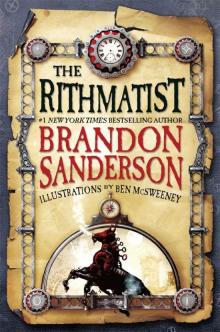 The Rithmatist
The Rithmatist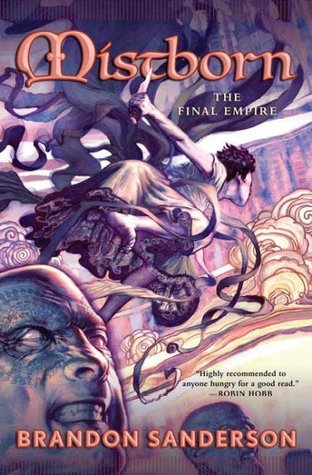 Mistborn: The Final Empire
Mistborn: The Final Empire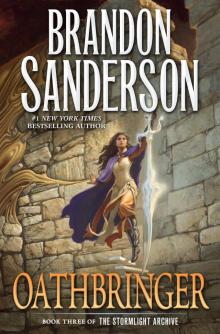 Oathbringer
Oathbringer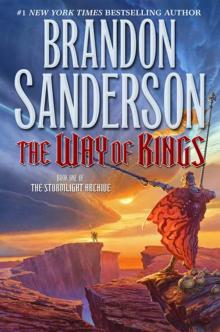 The Way of Kings
The Way of Kings Redemption
Redemption Skin Deep
Skin Deep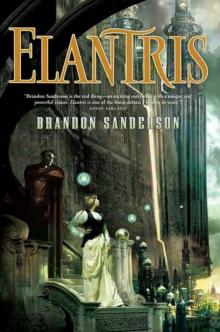 Elantris
Elantris Snapshot
Snapshot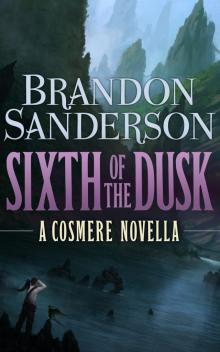 Sixth of the Dusk (Cosmere)
Sixth of the Dusk (Cosmere)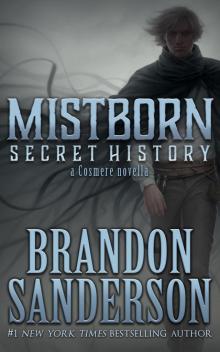 Mistborn: Secret History
Mistborn: Secret History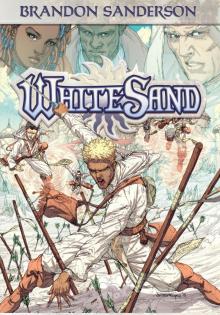 White Sand, Volume 1
White Sand, Volume 1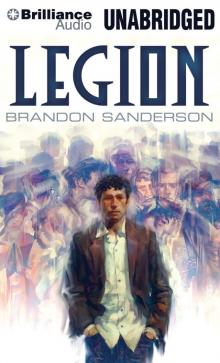 Legion
Legion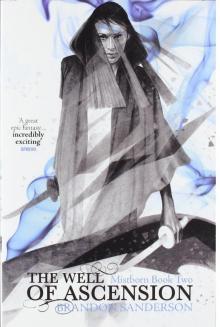 The Well of Ascension
The Well of Ascension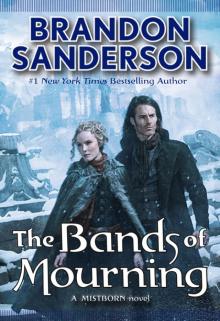 The Bands of Mourning
The Bands of Mourning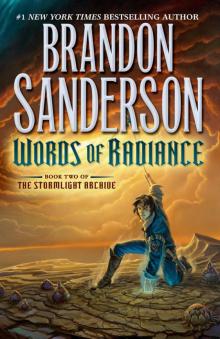 Words of Radiance
Words of Radiance The Hero of Ages
The Hero of Ages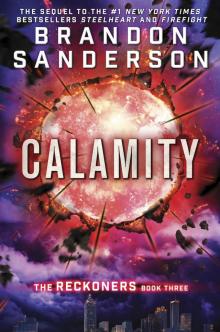 Calamity
Calamity Alcatraz Versus the Scrivener's Bones
Alcatraz Versus the Scrivener's Bones The Alloy of Law
The Alloy of Law The Emperors Soul
The Emperors Soul The Dark Talent
The Dark Talent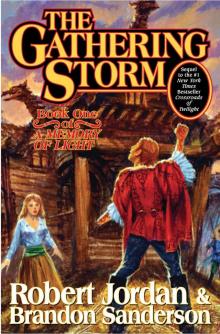 The Gathering Storm
The Gathering Storm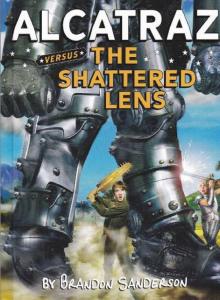 Alcatraz Versus the Shattered Lens
Alcatraz Versus the Shattered Lens Mitosis
Mitosis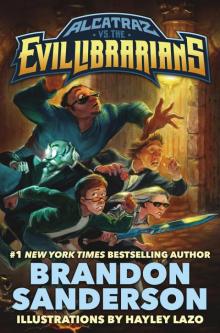 Alcatraz vs. The Evil Librarians
Alcatraz vs. The Evil Librarians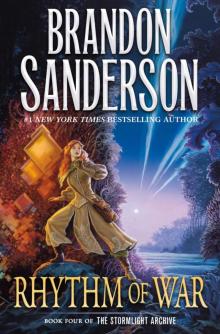 Rhythm of War (9781429952040)
Rhythm of War (9781429952040)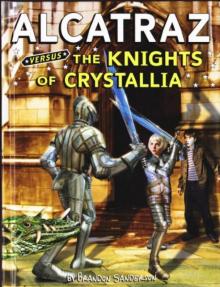 Alcatraz Versus the Knights of Crystallia
Alcatraz Versus the Knights of Crystallia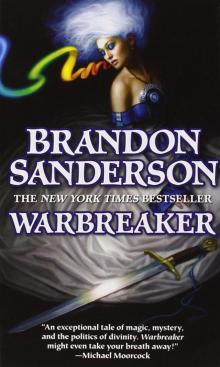 Warbreaker
Warbreaker Firstborn
Firstborn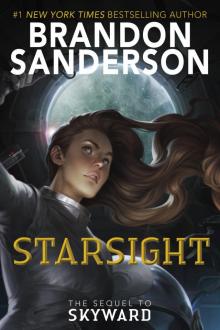 Starsight
Starsight Edgedancer
Edgedancer Perfect State
Perfect State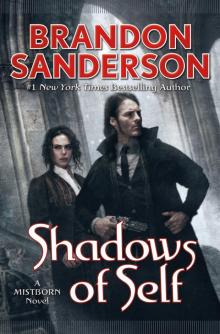 Shadows of Self
Shadows of Self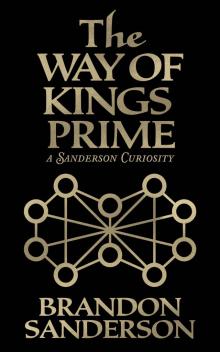 The Way of Kings Prime
The Way of Kings Prime Starsight (US)
Starsight (US)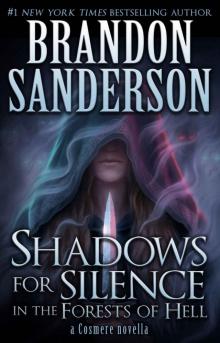 Shadows for Silence in the Forests of Hell
Shadows for Silence in the Forests of Hell Arcanum Unbounded: The Cosmere Collection
Arcanum Unbounded: The Cosmere Collection Awakening
Awakening Firefight
Firefight Dawnshard
Dawnshard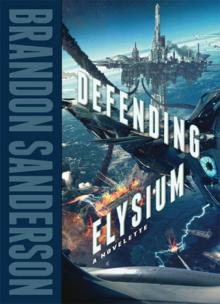 Defending Elysium
Defending Elysium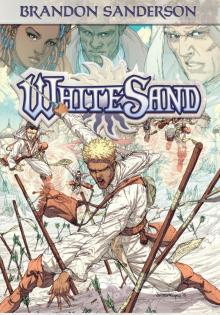 White Sand
White Sand Infinity Blade: Redemption
Infinity Blade: Redemption The Final Empire
The Final Empire Skyward
Skyward Lies of the Beholder
Lies of the Beholder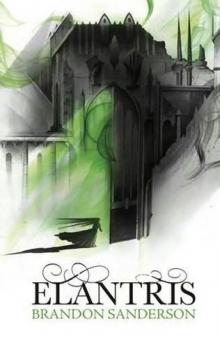 Elantris e-1
Elantris e-1 Steelheart r-1
Steelheart r-1 Legion: Skin Deep
Legion: Skin Deep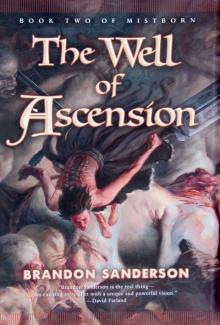 Well of Ascension
Well of Ascension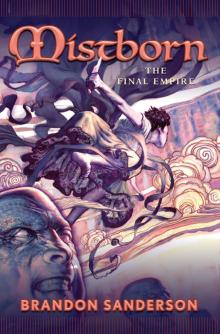 Mistborn
Mistborn Alcatraz versus the Evil Librarians
Alcatraz versus the Evil Librarians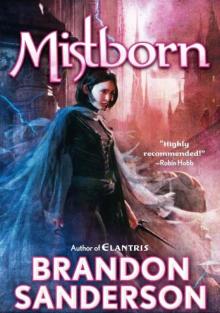 The Final Empire m-1
The Final Empire m-1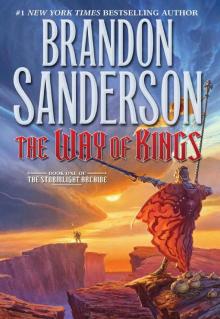 The Way of Kings (Stormlight Archive, The)
The Way of Kings (Stormlight Archive, The)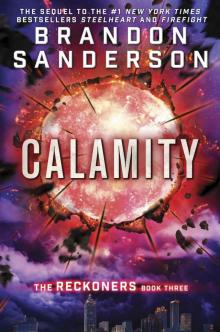 Calamity (The Reckoners)
Calamity (The Reckoners) Legion and the Emperor's Soul
Legion and the Emperor's Soul Legion: The Many Lives of Stephen Leeds
Legion: The Many Lives of Stephen Leeds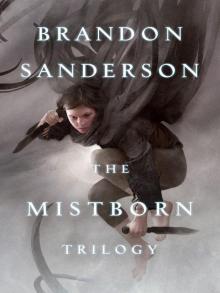 The Mistborn Trilogy
The Mistborn Trilogy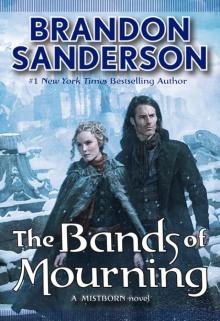 Bands of Mourning
Bands of Mourning Alcatraz
Alcatraz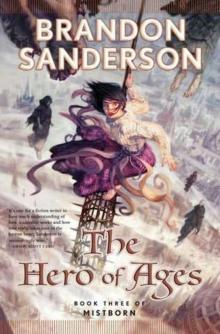 The Hero of Ages m-3
The Hero of Ages m-3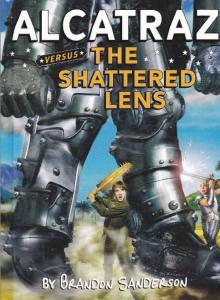 Alcatraz vs. the Shattered Lens
Alcatraz vs. the Shattered Lens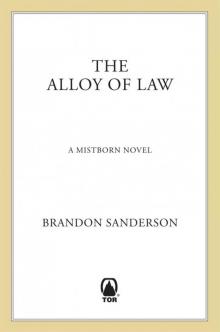 The Alloy of Law: A Mistborn Novel
The Alloy of Law: A Mistborn Novel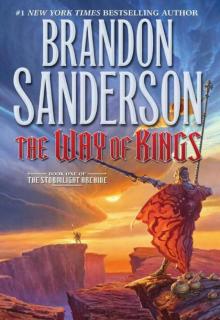 The Way of Kings sa-1
The Way of Kings sa-1 Infinity Blade: Awakening
Infinity Blade: Awakening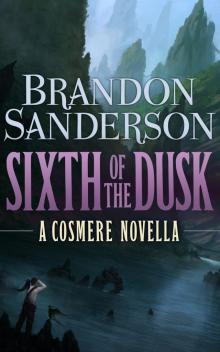 Sixth of the Dusk
Sixth of the Dusk The Stormlight Archive
The Stormlight Archive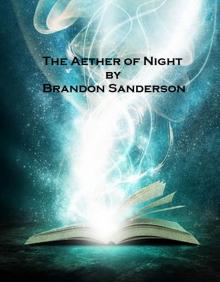 The Aether of Night
The Aether of Night